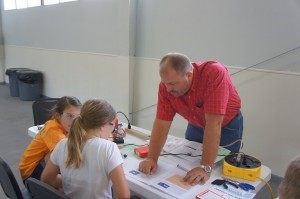by Niki Crawson | Oct 11, 2013

Volunteer teaching local youth how to build underwater robots.
The goal of 4-H is to teach youth life skills. In so doing, we find that we also equip them with marketable skills, a sense of belonging, and a sense of self-worth, each of which makes them more apt to be successful. However, besides the most obvious benefit that your volunteer services are to your local youth and community, there are benefits for you personally as well. In fact, studies indicate that individuals who volunteer, experience greater health benefits,1 and in some cases, that individuals can combat the onset of depression simply by volunteering.2 Additional personal benefits of volunteerism include increased social skills, and an expanded social network.
Another thing to consider is that by volunteering with 4-H you will have the opportunity to make a positive difference in the lives of children. This more than likely will trigger a sense of commitment, pride, and accomplishment in you which leads to a more positive self-image. The more positive your self-image, the more likely you are to set and accomplish positive personal goals, thus feeling a sense of accomplishment which creates a continuous circle of self-worth and confidence.
One of the most undervalued benefits of volunteering with 4-H is the time spent practicing the very life skills you are teaching through 4-H programming like communication, teamwork, and program planning. As you work with your youth to help them develop these life skills, you too are strengthening them in yourself. When they combine their increased life skills with taking part in the wide variety of training opportunities presented through 4-H, some volunteers may open new doors for employment based on the skills they have learned and developed.
In today’s time when families are busier than ever and time seems limited, having a positive adult role model can truly influence the path of youth. Volunteering with a 4-H program allows these positive impacts to occur. If you are already a 4-H volunteer, take pride in your contributions and reap the joy and benefits associated with such. If you are not currently a volunteer, the great news is that you do not have to look far to find a perfect match for your volunteerservices…the Florida 4-H program welcomes you, and area 4-H Agents are eager to help you get started!
1 Dulin and Hill, 2003; Brown et al., 2005; Brown et al., 2003; Liang et al., 2001; Morrow-Howell et al., 2003; Midlarsky and Kahana, 1994; and Schwartz et al., 2003
2 Depression Alliance http://www.depressionalliance.org/latest-news/volunteering-combats-depression.php
by Niki Crawson | Mar 29, 2013
Spring and summer seasons can seem like a busier time than normal for 4-H volunteers. Between 4-H/Tropicana, shooting sports matches, volunteer trainings and upcoming summer day camps, 4-H becomes a world of its own with wonderful youth development opportunities to teach needed life skills to our youth. However, with the busy season approaching, concern of the dreaded VOLUNTEER BURNOUT is real. It typically rears its ugly head starting in April and really takes a hold by June. By July, it has claimed more volunteer victims than we like to admit. It is dark, ugly, and heavy. It preys on the unsuspecting, the tired, the unselfish.

Do you feel the burn?
What causes volunteer burnout, and how does one recognize it before it attacks? Volunteer burnout can be a result of one or more factors such as over commitment, lack of sufficient breaks and rest, excessive responsibilities, an inability to say “no” and so on. Volunteer burnout will typically prey on the loyal, unselfish, dedicated volunteer who wants to make a difference but may do so too much, too fast, and/or too often. The only way to avoid volunteer burnout is to…take time for YOU.
“Wait, what? Take time for myself? But what about the youth I am positively impacting through 4-H?” you may ask. Well, the old saying “you cannot help others if you are not taking care of yourself first” applies here. In order for this to occur, you have to tend to yourself and have a healthy balance established between your needs, your family, work, etc.
If you are concerned that you are starting to feel the effects of volunteer burnout, talk to your 4-H Agent immediately. Find out what can be done to help you ease the burden you are feeling. Sometimes, it is a simple solution of talking through your concerns and frustrations regarding your schedule and setting priorities and new boundaries. Other times it may mean getting more sleep, exercise, or starting a hobby that relaxes you. Then again, sometimes it may require that more drastic measures be implemented such as giving up a task, learning to say “no” more often or even taking a few weeks off from your volunteer duties to tend to your own needs by enjoying the beautiful weather and working in your garden.
So, before you let the nasty volunteer burnout monster bite and send you running from the wonderful 4-H program you are involved in, we urge you to maintain a healthy balance between dedicated and delirious. Take time for yourself. Eat healthy. Exercise regularly. Spend quality time with family and friends. Enjoy the spring days. Visit the UF IFAS EDIS website (http://edis.ifas.ufl.edu/) for fantastic gardening tips. Remember that you have the 4-H family in your corner supporting you 100% in your need for a little “you” time!


